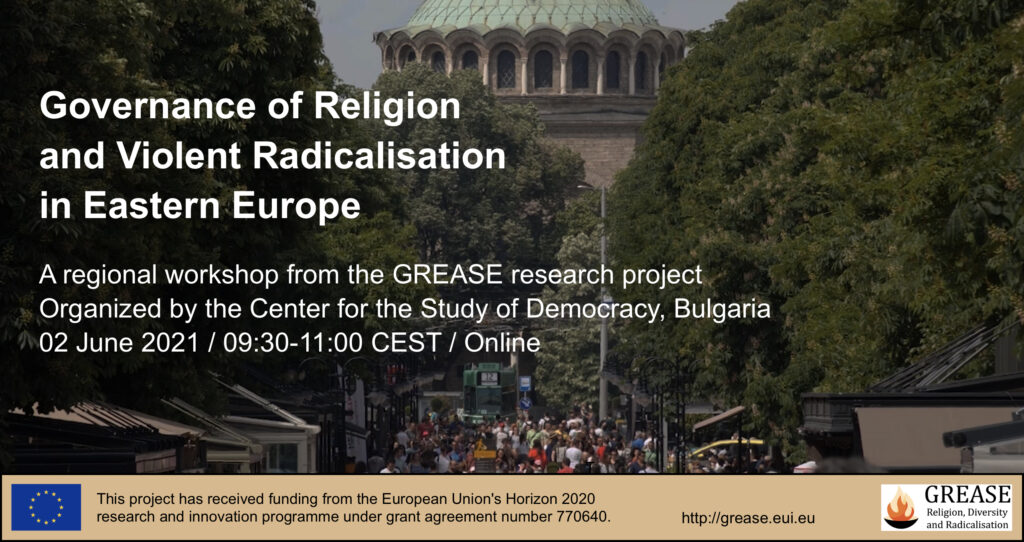Workshop completed. A recording is available. Please send requests to Valentina.Bettin@eui.eu
02 June 2021 / 09:30 – 11:00 CEST / Online (Zoom)
Languages: English & Bulgarian (two-way interpreting service)
A GREASE Regional Workshop / Organized by the Center for the Study of Democracy, Bulgaria / Technical Host: European University Institute (EUI) – Florence, Italy

Two-step registration:
1. Create account with EUI or log in to existing account
2. Sign up for workshop
Background
The end of Communism marked a changing role of religion in the countries of Central Eastern, South Eastern and East Eastern Europe1. In contrast to their atheist nature during Communism, these countries have largely embraced a stronger focus on religious affiliation, though mainly in the framework of pronouncedly secular systems of state-religion relations. Recently, the role of religion in the region has become even more significant, be it through its instrumentalization to achieve EU-accession goals or as an ideological tool to consolidate political power internally. In the complex reality of rising nationalism bordering on xenophobia – and attacks on vulnerable religious minorities in some of these countries – governing religion and religious diversity has become an important task on the political agenda. To further complicate things, parallel processes of radicalisation, some of them violent, have marked the post-Communist reality in some of these states. Policy and public debates around counter-terrorism measures and security-led responses to the perceived threat of violent radicalisation risk amplifying diversity challenges, including ethno-religious ones. Such dynamics raise important questions. Among them:
Workshop Focus
- What is the relationship between religion and the management of religion on the one hand, and processes of radicalisation and violent extremism on the other?
- And how can policies aimed at countering violent extremism in the region avoid exacerbating problems related to diversity management?
PROGRAMME
Opening
Dr. Liliya Yakova, Director, Sociological Program, Center for the Study of Democracy, Bulgaria
Governance of Religion and Violent Radicalisation in Eastern Europe
Rositsa Dzhekova, Director, Security Program, Center for the Study of Democracy, Bulgaria
Sub-Regional Perspectives on Religion and Violent Radicalisation
Dr. Ekaterina Sokirianskaia, Director, Conflict Analysis and Prevention Centre, Russia
> Perspectives on the North Caucasus
Prof. Dr. Evgenia Ivanova, Department of Political Science, New Bulgarian University, Bulgaria
> Perspectives on Bulgaria
Prof. Dr. Egdūnas Račius, Department of Area Studies, Vytautas Magnus University, Lithuania
> Perspectives on Central Eastern Europe
Prof. Dr. Sead Turčalo, Associate Professor, Department of Peace and Security Studies, Dean of Faculty of Political Science, University of Sarajevo, Bosnia and Herzegovina
> Perspectives on the Western Balkans
— Final 25 min. Q&A / Closing remarks —
1. Included within these sub-regions are: Albania, Bulgaria, Croatia, the Czech Republic, Estonia, Hungary, Latvia, Lithuania, Poland, Romania, Slovakia, Slovenia, Bosnia and Herzegovina, Kosovo, North Macedonia, Montenegro, Serbia, Ukraine, Republic of Moldova, Belarus, the European parts of Russia.
